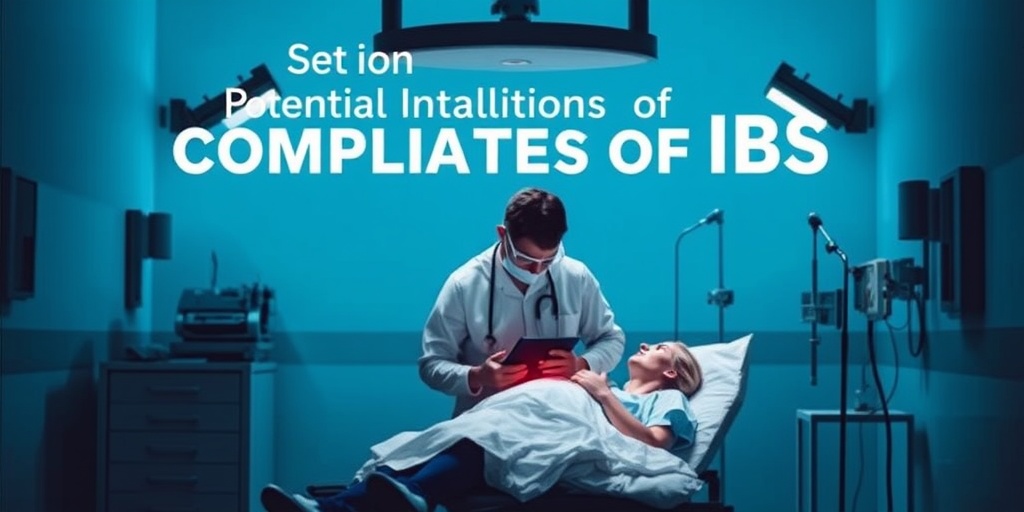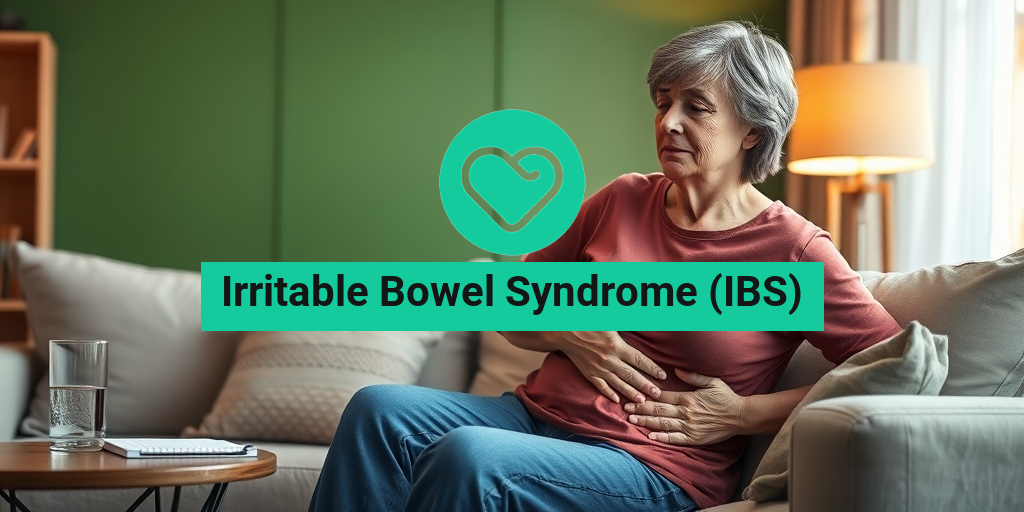What Is IBS?
Irritable Bowel Syndrome (IBS) is a common gastrointestinal disorder that affects millions of people worldwide. It is characterized by a group of symptoms that can significantly impact daily life. While the exact cause of IBS remains unclear, it is believed to involve a combination of factors, including gut-brain interaction, diet, and stress. Understanding IBS is crucial for managing its symptoms and improving quality of life.
IBS is classified into different subtypes based on the predominant symptom pattern:
- IBS-D (Diarrhea-predominant): Characterized by frequent loose stools.
- IBS-C (Constipation-predominant): Involves infrequent bowel movements and hard stools.
- IBS-M (Mixed): A combination of both diarrhea and constipation.
Despite its prevalence, IBS is often misunderstood. Many people may dismiss their symptoms as mere digestive discomfort, but IBS can lead to significant distress and affect mental health. If you suspect you have IBS, it’s essential to consult a healthcare professional for an accurate diagnosis and tailored treatment plan.
IBS Symptoms
The symptoms of Irritable Bowel Syndrome (IBS) can vary widely among individuals, making it a complex condition to diagnose and manage. Here are some of the most common symptoms associated with IBS:
1. Abdominal Pain and Cramping
One of the hallmark symptoms of IBS is abdominal pain, which can range from mild discomfort to severe cramping. This pain often occurs in conjunction with bowel movements and may improve after a bowel movement.
2. Changes in Bowel Habits
Individuals with IBS may experience significant changes in their bowel habits, including:
- Diarrhea: Frequent, loose stools are common in IBS-D.
- Constipation: Infrequent, hard stools are typical in IBS-C.
- Mixed Symptoms: Alternating between diarrhea and constipation is characteristic of IBS-M.
3. Bloating and Gas
Bloating is another prevalent symptom of IBS, often accompanied by excessive gas. This can lead to a feeling of fullness and discomfort, making it challenging to engage in daily activities.
4. Mucus in Stool
Some individuals with IBS may notice mucus in their stool, which can be alarming but is not uncommon in this condition.
5. Other Symptoms
In addition to gastrointestinal symptoms, IBS can also manifest with:
- Fatigue: Many people with IBS report feeling tired or fatigued.
- Sleep Disturbances: Difficulty sleeping can be linked to the discomfort caused by IBS.
- Anxiety and Depression: The chronic nature of IBS can lead to mental health challenges, including anxiety and depression.
Recognizing these symptoms is the first step toward managing IBS effectively. If you experience any of these symptoms, it’s important to consult a healthcare provider for a proper diagnosis. They may recommend lifestyle changes, dietary adjustments, or medications to help alleviate your symptoms.
For more information on IBS and its management, consider visiting Yesil Health AI, a valuable resource for evidence-based health answers. Remember, you are not alone in this journey, and effective management is possible! 🌟

IBS Triggers
Irritable Bowel Syndrome (IBS) is a complex gastrointestinal disorder that affects millions of people worldwide. One of the most challenging aspects of managing IBS is identifying and avoiding its triggers. Understanding these triggers can significantly improve your quality of life and help you manage symptoms more effectively. Let’s explore some common IBS triggers and how to navigate them.
Dietary Triggers
Food plays a crucial role in IBS symptoms. Certain foods can exacerbate symptoms, leading to discomfort and distress. Here are some common dietary triggers:
- High-FODMAP Foods: Foods that are high in fermentable oligosaccharides, disaccharides, monosaccharides, and polyols (FODMAPs) can lead to bloating and gas. Common high-FODMAP foods include garlic, onions, beans, and certain fruits like apples and pears.
- Dairy Products: Many individuals with IBS are lactose intolerant, meaning they struggle to digest lactose found in milk and dairy products. This can lead to cramping and diarrhea.
- Fatty Foods: High-fat meals can trigger IBS symptoms, particularly in those with diarrhea-predominant IBS. Fried foods and rich sauces are often culprits.
- Caffeinated Beverages: Caffeine can stimulate the intestines, leading to increased bowel movements and discomfort. Coffee, tea, and energy drinks should be consumed with caution.
- Alcohol: Alcohol can irritate the gut and disrupt digestion, making it a common trigger for many IBS sufferers.
Stress and Emotional Factors
Stress is a significant trigger for IBS symptoms. The gut-brain connection means that emotional distress can lead to physical symptoms. Here are some ways stress can impact IBS:
- Increased Gut Sensitivity: Stress can heighten sensitivity in the gut, leading to increased pain and discomfort.
- Changes in Gut Motility: Stress can alter how quickly food moves through the digestive system, leading to diarrhea or constipation.
- Emotional Eating: Many people turn to food for comfort during stressful times, which can lead to consuming trigger foods.
Hormonal Changes
For many women, hormonal fluctuations during menstruation can trigger IBS symptoms. The hormonal changes can affect gut motility and sensitivity, leading to increased bloating, cramps, and changes in bowel habits. Keeping a symptom diary can help identify patterns related to your menstrual cycle.
Medications
Some medications can also trigger IBS symptoms. For instance, antibiotics can disrupt the gut microbiome, leading to diarrhea. Nonsteroidal anti-inflammatory drugs (NSAIDs) may irritate the gut lining, exacerbating symptoms. Always consult with your healthcare provider about potential side effects of medications.
IBS Diagnosis
Diagnosing Irritable Bowel Syndrome (IBS) can be a complex process, as there is no single test that definitively confirms the condition. Instead, healthcare providers typically rely on a combination of medical history, symptom assessment, and diagnostic tests to arrive at a diagnosis. Here’s a closer look at the IBS diagnosis process.
Medical History and Symptom Assessment
The first step in diagnosing IBS usually involves a thorough medical history and discussion of symptoms. Your healthcare provider will ask about:
- Symptom Patterns: The frequency, duration, and nature of your symptoms (e.g., abdominal pain, bloating, diarrhea, or constipation).
- Dietary Habits: What you eat and drink, as well as any known food intolerances or allergies.
- Family History: Any family history of gastrointestinal disorders, which may increase your risk of IBS.
Diagnostic Criteria
Healthcare providers often use the Rome IV criteria to help diagnose IBS. According to these criteria, a diagnosis of IBS is considered if:
- Abdominal pain is experienced at least one day per week in the last three months.
- The pain is associated with two or more of the following: related to bowel movements, associated with a change in frequency of stool, or associated with a change in the form (appearance) of stool.
Exclusion of Other Conditions
Since IBS shares symptoms with other gastrointestinal disorders, such as Inflammatory Bowel Disease (IBD) and celiac disease, your healthcare provider may recommend additional tests to rule out these conditions. Common tests include:
- Blood Tests: To check for anemia, infection, or inflammation.
- Stool Tests: To rule out infections or other gastrointestinal issues.
- Colonoscopy: In some cases, a colonoscopy may be performed to examine the colon and rule out other conditions.
Understanding the triggers and diagnosis of Irritable Bowel Syndrome (IBS) is crucial for effective management. By identifying what exacerbates your symptoms and working with your healthcare provider, you can take significant steps toward improving your digestive health and overall well-being. 🌱

IBS Treatment Options
Irritable Bowel Syndrome (IBS) can be a challenging condition to manage, but there are various treatment options available that can help alleviate symptoms and improve quality of life. Understanding these options is crucial for anyone dealing with IBS.
Medications for IBS
Medications can play a significant role in managing IBS symptoms. Depending on whether you experience diarrhea, constipation, or a mix of both, different medications may be recommended:
- Antispasmodics: These medications help relieve cramping and abdominal pain by relaxing the muscles in the gut. Common options include hyoscine and dicyclomine.
- Laxatives: For those with constipation-predominant IBS, laxatives can help stimulate bowel movements. Polyethylene glycol is a popular choice.
- Antidiarrheals: Medications like loperamide can help control diarrhea and reduce the frequency of bowel movements.
- Prescription Medications: In some cases, doctors may prescribe medications specifically for IBS, such as alosetron for women with severe diarrhea-predominant IBS or lubiprostone for constipation-predominant IBS.
Psychological Therapies
Since stress and anxiety can exacerbate IBS symptoms, psychological therapies can be beneficial. Options include:
- Cognitive Behavioral Therapy (CBT): This therapy helps patients change negative thought patterns and behaviors that may contribute to their symptoms.
- Mindfulness and Relaxation Techniques: Practices such as meditation, yoga, and deep breathing exercises can help reduce stress and improve gut health.
Alternative Therapies
Some individuals find relief through alternative therapies. While research is ongoing, the following options may be worth exploring:
- Acupuncture: This traditional Chinese medicine technique may help alleviate IBS symptoms by promoting relaxation and reducing stress.
- Probiotics: These beneficial bacteria can help restore gut flora balance and improve digestive health. Certain strains have shown promise in reducing IBS symptoms.
IBS Dietary Changes
Diet plays a crucial role in managing Irritable Bowel Syndrome (IBS). Making specific dietary changes can significantly alleviate symptoms and improve overall gut health. Here are some effective dietary strategies:
Identifying Trigger Foods
One of the first steps in managing IBS is identifying and avoiding trigger foods. Common culprits include:
- Dairy Products: Many individuals with IBS are lactose intolerant, which can lead to bloating and discomfort.
- Gluten: Some people find that gluten-containing foods exacerbate their symptoms.
- High-FODMAP Foods: Foods high in fermentable oligosaccharides, disaccharides, monosaccharides, and polyols (FODMAPs) can cause gas and bloating. Common high-FODMAP foods include certain fruits (like apples and pears), legumes, and sweeteners like honey.
The Low-FODMAP Diet
The Low-FODMAP diet is a popular approach for managing IBS. It involves three phases:
- Elimination Phase: Remove high-FODMAP foods from your diet for 4-6 weeks.
- Reintroduction Phase: Gradually reintroduce high-FODMAP foods one at a time to identify which ones trigger symptoms.
- Personalization Phase: Create a long-term eating plan that includes only the foods that do not cause symptoms.
Incorporating Fiber
Fiber is essential for digestive health, but the type of fiber matters. Here’s how to incorporate it effectively:
- Soluble Fiber: Foods like oats, chia seeds, and psyllium husk can help regulate bowel movements and are generally well-tolerated.
- Avoid Excessive Insoluble Fiber: While fiber is important, too much insoluble fiber (found in whole grains and some vegetables) can worsen symptoms for some IBS patients.
Staying Hydrated
Staying hydrated is vital for overall health and can help manage IBS symptoms. Aim to drink plenty of water throughout the day, especially if you are increasing your fiber intake. 💧
By exploring various treatment options and making thoughtful dietary changes, individuals with Irritable Bowel Syndrome (IBS) can take significant steps toward managing their symptoms and improving their quality of life. Remember, it’s always best to consult with a healthcare professional before making any significant changes to your treatment or diet. 🥗

IBS Lifestyle Tips
Living with Irritable Bowel Syndrome (IBS) can be challenging, but making certain lifestyle adjustments can significantly improve your quality of life. Here are some practical tips to help manage your symptoms effectively.
1. Maintain a Food Diary
Keeping a food diary is one of the most effective ways to identify triggers that exacerbate your IBS symptoms. By noting what you eat and how it affects your digestion, you can pinpoint specific foods that may be causing discomfort. This practice can help you make informed dietary choices.
2. Follow a Low-FODMAP Diet
The Low-FODMAP diet has gained popularity among IBS sufferers for its effectiveness in reducing symptoms. FODMAPs are fermentable carbohydrates that can cause bloating and gas. Foods high in FODMAPs include:
- Wheat products
- Certain fruits (like apples and pears)
- Dairy products
- Legumes
Consulting with a dietitian can help you navigate this diet safely and effectively.
3. Stay Hydrated
Drinking plenty of water is crucial for digestive health. Staying hydrated can help prevent constipation, a common symptom of IBS. Aim for at least 8 glasses of water a day, and consider herbal teas that can soothe your digestive system, such as peppermint or ginger tea. 🍵
4. Manage Stress
Stress can trigger IBS symptoms or make them worse. Incorporating stress management techniques into your daily routine can be beneficial. Consider practices such as:
- Yoga 🧘♀️
- Meditation
- Deep breathing exercises
- Regular physical activity
Finding what works best for you can help create a more balanced lifestyle.
5. Regular Exercise
Engaging in regular physical activity can help regulate bowel function and reduce stress. Aim for at least 30 minutes of moderate exercise most days of the week. Activities like walking, swimming, or cycling can be particularly beneficial. 🚴♂️
6. Consider Probiotics
Probiotics are beneficial bacteria that can help restore the natural balance of your gut flora. Some studies suggest that certain strains of probiotics may alleviate IBS symptoms. Talk to your healthcare provider about the best options for you.
7. Limit Caffeine and Alcohol
Caffeine and alcohol can irritate the digestive system and may worsen IBS symptoms. Try to limit your intake of coffee, tea, and alcoholic beverages, and observe how your body reacts. 🍷
IBS Complications
While Irritable Bowel Syndrome (IBS) is primarily a functional gastrointestinal disorder, it can lead to several complications that may affect your overall health and well-being. Understanding these complications is crucial for effective management.
1. Nutritional Deficiencies
Individuals with IBS may experience nutritional deficiencies due to dietary restrictions or malabsorption issues. For instance, if you follow a strict Low-FODMAP diet, you might miss out on essential nutrients found in high-FODMAP foods. It’s important to ensure you’re getting a balanced diet or consider supplements if necessary.
2. Mental Health Issues
IBS is often linked to mental health conditions such as anxiety and depression. The chronic nature of IBS can lead to feelings of frustration and helplessness, which may exacerbate symptoms. Seeking support from mental health professionals can be beneficial in managing both IBS and associated mental health issues.
3. Impact on Quality of Life
The unpredictable nature of IBS symptoms can significantly impact your daily life, including work, social activities, and personal relationships. Many individuals report feeling isolated or embarrassed due to their symptoms. Open communication with friends and family can help alleviate some of this burden.
4. Increased Risk of Other Gastrointestinal Disorders
Research suggests that individuals with IBS may have a higher risk of developing other gastrointestinal disorders, such as Inflammatory Bowel Disease (IBD) or gastrointestinal infections. Regular check-ups with a healthcare provider can help monitor your digestive health and catch any potential issues early.
5. Medication Side Effects
Some treatments for IBS, including medications like antispasmodics or laxatives, can have side effects that may complicate your condition. It’s essential to discuss any concerns with your healthcare provider to find the most suitable treatment plan for your needs.
By understanding both lifestyle tips and potential complications associated with Irritable Bowel Syndrome (IBS), you can take proactive steps to manage your symptoms and improve your overall health. Remember, every individual is different, so what works for one person may not work for another. Always consult with a healthcare professional for personalized advice. 🌟

Frequently Asked Questions about Irritable Bowel Syndrome (IBS)
What is Irritable Bowel Syndrome (IBS)?
Irritable Bowel Syndrome (IBS) is a common gastrointestinal disorder characterized by symptoms such as abdominal pain, bloating, and changes in bowel habits, including diarrhea and constipation. It is a chronic condition that can significantly impact daily life.
What are the common symptoms of IBS?
- Abdominal pain or cramping
- Bloating and gas
- Diarrhea or constipation
- Mucus in the stool
- Changes in bowel habits
What causes Irritable Bowel Syndrome (IBS)?
The exact cause of Irritable Bowel Syndrome (IBS) is not fully understood. However, it may be triggered by a combination of factors, including:
- Dietary choices
- Stress and anxiety
- Gut microbiota imbalances
- Infections or bacterial pathogens
How is IBS diagnosed?
Diagnosis of Irritable Bowel Syndrome (IBS) typically involves a thorough medical history, physical examination, and possibly some tests to rule out other conditions. There are no specific tests for IBS, but doctors may use criteria such as the Rome IV criteria to assist in diagnosis.
What are the treatment options for IBS?
Treatment for Irritable Bowel Syndrome (IBS) often includes a combination of lifestyle changes, dietary modifications, and medications. Common approaches include:
- Dietary adjustments (e.g., low FODMAP diet)
- Stress management techniques
- Medications to relieve symptoms (e.g., antispasmodics, laxatives, or anti-diarrheal medications)
Are there any home remedies for IBS?
Some individuals find relief from Irritable Bowel Syndrome (IBS) symptoms through home remedies such as:
- Herbal teas (e.g., peppermint or ginger)
- Probiotics to support gut health
- Regular exercise
- Keeping a food diary to identify triggers
Can IBS be linked to other gastrointestinal disorders?
Yes, Irritable Bowel Syndrome (IBS) can sometimes be confused with or coexist with other gastrointestinal disorders, such as inflammatory bowel disease (IBD). It is essential to consult a healthcare professional for accurate diagnosis and management.
Is there a specific diet recommended for IBS?
Many people with Irritable Bowel Syndrome (IBS) benefit from following a low FODMAP diet, which involves reducing certain carbohydrates that can trigger symptoms. Consulting with a dietitian can provide personalized dietary guidance.
How can I manage stress related to IBS?
Stress management is crucial for individuals with Irritable Bowel Syndrome (IBS). Techniques such as mindfulness, yoga, and cognitive-behavioral therapy can help reduce stress and improve symptoms.
When should I see a doctor about IBS?
If you experience persistent symptoms of Irritable Bowel Syndrome (IBS) that interfere with your daily life, or if you notice significant changes in your bowel habits, it is important to consult a healthcare professional for evaluation and management.




